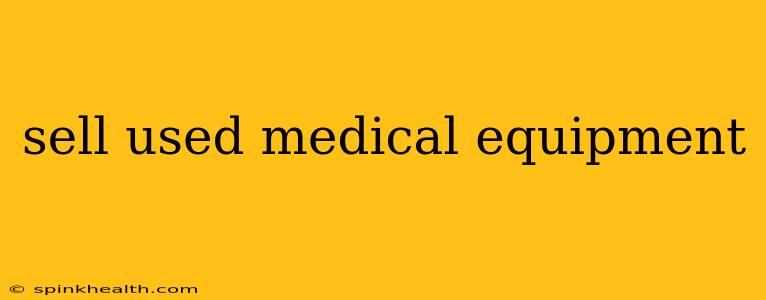Navigating the World of Selling Used Medical Equipment: A Seller's Guide
The hum of a hospital, the whir of sophisticated machinery – the medical equipment industry is a complex world. But what happens when hospitals upgrade their technology, or clinics downsize? That's where the market for used medical equipment comes in. Selling used medical equipment can be lucrative, but it requires careful navigation. This guide will walk you through the process, answering common questions and offering expert advice.
Why Sell Used Medical Equipment?
Hospitals and clinics often face budget constraints. Upgrading to the latest technology is crucial for providing optimal patient care, but the costs are significant. Selling used equipment offers a solution, freeing up capital for new investments while providing a valuable resource to smaller clinics or international markets. For those selling, it's a chance to recoup some of the initial investment and avoid the disposal costs associated with obsolete technology.
How Do I Find Buyers for Used Medical Equipment?
This is perhaps the biggest question. Finding reliable buyers who understand the intricacies of medical equipment is crucial. Here are some avenues to explore:
- Online Marketplaces: Several online platforms specialize in medical equipment sales. These offer a broad reach and often have built-in verification systems to ensure buyer legitimacy. Research various platforms to find the best fit for your equipment.
- Direct Sales to Hospitals and Clinics: Networking within the healthcare industry can be incredibly effective. Direct contact allows for personalized negotiations and builds trust. Consider attending industry events and trade shows to connect with potential buyers.
- Medical Equipment Brokers: These intermediaries act as liaisons between sellers and buyers, managing the sales process. They often possess expertise in pricing, logistics, and regulatory compliance. This can significantly simplify the transaction, though it may involve a commission.
- Government Auctions: Depending on the location and type of equipment, government agencies may hold auctions for surplus medical equipment. This can be a lucrative avenue, but typically involves a competitive bidding process.
What Documentation Do I Need to Sell Used Medical Equipment?
Documentation is paramount. Proper documentation demonstrates the equipment's history, ensuring transparency and building buyer confidence. Essential documents include:
- Service Records: Complete maintenance and repair histories are vital, demonstrating the equipment's operational status and reliability.
- Calibration Certificates: These verify that the equipment’s measurements are accurate, a critical factor for medical applications.
- Manuals and Operating Instructions: Providing comprehensive documentation helps buyers understand the equipment's functionality and operation.
- Compliance Certifications: Ensure that the equipment meets all relevant safety and regulatory standards.
How Do I Determine the Fair Market Value of Used Medical Equipment?
Pricing your equipment accurately is key. Overpricing can deter buyers, while underpricing means losing potential profits. Consider these factors:
- Age and Condition: Newer, well-maintained equipment commands higher prices. Thorough inspections and honest assessments are crucial.
- Market Demand: Research similar equipment currently listed for sale to gauge market prices.
- Technological Advancements: Older models might be worth less due to advancements in technology.
- Features and Functionality: Unique features or specialized capabilities can influence the price.
What Are the Legal and Regulatory Considerations?
Selling used medical equipment involves legal and regulatory considerations. These vary by location, but generally include:
- Compliance with Safety Standards: Ensuring the equipment meets all relevant safety and regulatory standards is crucial.
- Proper Disposal of Hazardous Materials: If your equipment contains hazardous materials, you must comply with environmental regulations for proper disposal or recycling.
Navigating the sale of used medical equipment can be rewarding, but understanding the process, documentation, and regulatory requirements is key to a successful transaction. Thorough preparation and a professional approach will significantly improve your chances of a smooth and profitable sale.

